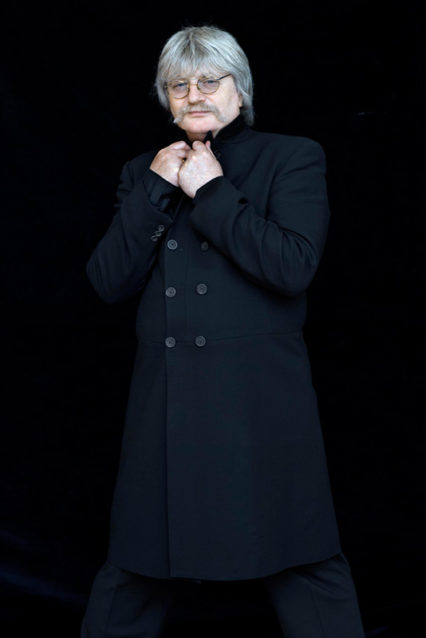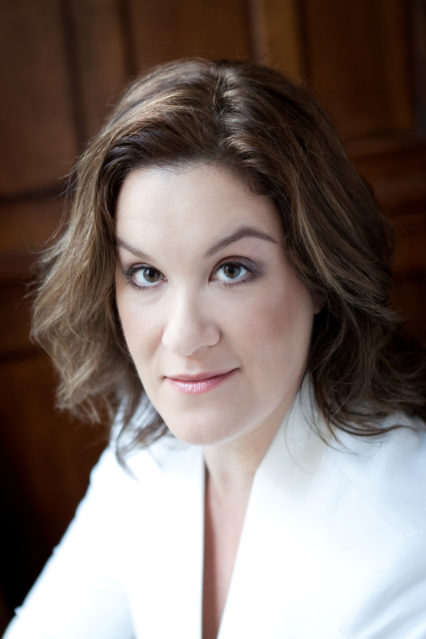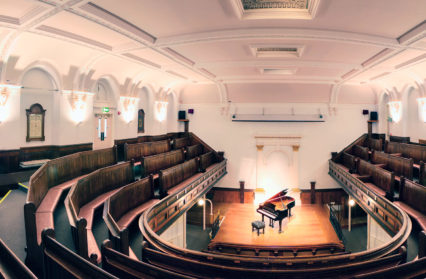Machynlleth Music Festival: Y Tabernacl
Friday 24 August 2018
Sir Karl Jenkins
Mangova, Lomeiko & Helmerson Piano Trio
Alice Coote / Julius Drake
The market town of Machynlleth has been host to an annual music festival since 1987 and this year’s programme, with its assembly of Welsh and international musicians, continued to offer an exciting mélange of chamber and vocal music. I caught up with events on day six of this week-long festival to hear an international piano trio in concert early evening, followed by the English mezzo soprano Alice Coote in a stunning late-night recital.

But first, at lunchtime, I attended a talk on the achievements of Karl Jenkins, this year’s recipient of the prestigious Gwobr Glyndŵr Award – a silver medal given every three years by the Machynlleth Tabernacle Trust to a pre-eminent figure in Wales who has made an outstanding contribution to music, art and literature. Welsh conductor Eilir Owen Griffiths gave a power-point presentation with a short video by the composer (created in lieu of a personal appearance) outlining his career from membership of the progressive rock band Soft Machine, international recognition for The Armed Man and acceptance of a knighthood in 2015, the first ever such honour for a Welsh composer.
As one of the most-performed living composers in the world, it’s intriguing that Jenkins’ most notable successes are two sacred works (The Armed Man and Requiem), both written this century against a background of widespread secularisation. This phenomenon could have been explored by the presenter, as could the historical context of Jenkins within the rich fabric of Welsh composers past and present.
The past was very much to the fore in the first of the evening’s concerts of the Machynlleth Music Festival where musicians from Bulgaria, Russia and Sweden brought a distinctly international flavour to Y Tabernacl, a former Welsh chapel blessed with an obliging acoustic. Notwithstanding the disappointing and unexplained programme change where Sergei Prokofiev’s Five Melodies for Violin and Piano was substituted for Enescu’s marvellous Third Violin Sonata, the three soloists gave engaging performances. A modicum of compensation for the loss of the Enescu was gained by the unexpected, but welcome addition of Béla Bartók’s Rumanian Folk Dances given by pianist Plamena Mangova. This was a forthright and sharply focused account that underlined the work’s incisive rhythms and tangy colouring – a characterisation of power, yet subtlety too.
On to Prokofiev’s Five Melodies Op. 35b (originally cast as songs for soprano and piano), where violinist Natalia Lomeiko responded to its elegant lyricism and abrupt mood changes with a flawless technique and sweet upper register. The composer’s effortless and often quirky melodic invention found a natural executor in Lomeiko’s nuanced account with Mangova as an attentive and yielding accompanist. Less successful was the collaboration between her and Frans Helmerson in Frédéric Chopin’s Sonata in G minor for cello and piano, where its brilliant piano writing occasionally overwhelmed the soloist. One was in no doubt of the composer’s dramatic instincts in the outer movements, but it was the heart-easing Largo which drew the most eloquent tones from this cellist.
After the interval Antonín Dvořák’s ‘Dumky’ Piano Trio in E minor (Op. 90) coaxed playing of rapt serenity and unbuttoned vigour, the three musicians capturing to perfection the music’s fireside warmth and joyful abandon. Contrasting tempi were well-judged and transparent textures illuminated by a corporate sensitivity, each player variously taking the limelight or supportive of one another in true chamber performance fashion. Without doubt this superb piano trio took the evening to a new level.

The performance ceiling had yet to be reached, however, and, for those fortunate to hear Alice Coote (replacing an indisposed Christine Rice) in a programme of English and French song, the evening’s music-making soared. She began with a burnished account of Elgar’s Sea Pictures (with Festival Director Julius Drake at the piano) and impressed with a wondrously cavernous low register that may have prompted echoes of Clara Butt for whom these songs were conceived when they appeared in 1899. They are also much-associated with Janet Baker and, in recent years Sarah Connolly, but Coote also fully identifies with Elgar’s settings and brought off a stunning rendition plumbing their emotional depths. Each phrase was sculptured anew (immeasurably improving the indifferent quality of some of the poems) and words were projected with such focus that even the softest notes carried. This was a performance that brimmed with intensity; the mysteries of the deep graphically conveyed in ‘Where corals lie’, and the “brave white horses” of ‘The Swimmer’ needed little imagination to conjure the swell of the sea. Coote is such a natural performer, and this was a masterclass in communication with her ever-mobile face seemingly directed towards everyone.
From Elgar she turned to 20th century French mélodie, and cherished Francis Poulenc’s infectious Voyage à Paris, expressing (via Guillaume Apollinaire’s words) the composer’s love of the French capital. The insouciant Hôtel (also Apollinaire) seemed wreathed in cigarette smoke and its indolence was caught to perfection. Two short songs by Reynaldo Hahn – Fumée and L’heure exquise – drew a softer, more delicate tone but no less intensely or poetically rendered. Coote ended with one of Poulenc’s signature songs Les Chemins de l’amour and, even without its concluding high note, was spell-binding for the sheer beauty of her tone. With such an exceptional recital, this festival must rank as one of Wales’ great cultural assets.
You might also like…
The Viennese Trios: Royal Welsh College Chamber Players performed at the RWCMD on Wednesday 3rd October, which Edward Christian-Hare attended.
David Truslove is a regular contributor to Wales Arts Review.











